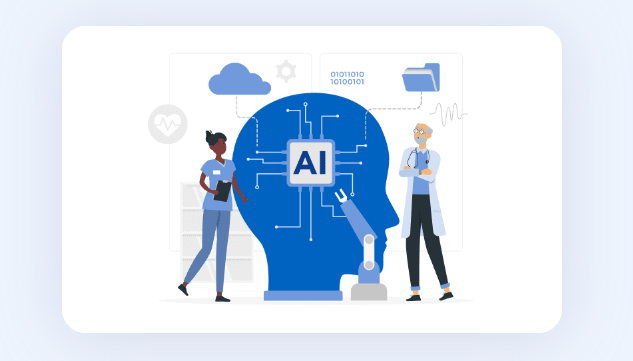Introduction:
In the dynamic realm of healthcare, the integration of Artificial Intelligence (AI) is propelling the industry into an era of unprecedented advancements. This article delves into the multifaceted examples of AI in healthcare, elucidating how these technological marvels are redefining patient outcomes, diagnostics, and overall medical practices.
The Role of AI in Medical Imaging
AI's prowess in medical imaging is reshaping diagnostics, enabling faster and more accurate assessments. Radiologists leverage AI algorithms to analyze complex images, leading to quicker identification of abnormalities and early detection of diseases.
Enhancing Diagnostics with AI
Incorporating AI into diagnostic processes has significantly elevated precision and efficiency. Through machine learning algorithms, healthcare professionals can analyze patient data, identify patterns, and make more informed decisions regarding treatment plans.
Personalized Treatment Plans
AI has ushered in an era of personalized medicine, tailoring treatment plans based on individual patient data. By considering genetic makeup, lifestyle factors, and medical history, AI algorithms assist in crafting treatments that are not only effective but also minimize adverse effects.
Virtual Health Assistants: A Patient-Centric Approach
Examples of AI in healthcare extend to virtual health assistants, offering a more patient-centric experience. These AI-driven companions provide information, reminders, and support, fostering improved patient engagement and adherence to treatment plans.
Drug Discovery Acceleration
Revolutionizing the pharmaceutical landscape, AI expedites drug discovery processes. Through predictive modeling and data analysis, AI identifies potential drug candidates, significantly reducing the time and resources required for bringing new medications to market.
Predictive Analytics for Patient Outcomes
Harnessing the power of predictive analytics, AI assists healthcare providers in anticipating patient outcomes. By analyzing historical data, AI can predict disease progression, allowing for proactive interventions and improved long-term management.
Telehealth Advancements
AI plays a pivotal role in enhancing telehealth services. From virtual consultations to remote patient monitoring, these examples of AI in healthcare bridge geographical gaps, ensuring patients receive timely and efficient medical attention.
Improving Administrative Efficiency
Beyond clinical applications, AI streamlines administrative tasks, from billing and scheduling to data entry. This not only reduces the burden on healthcare professionals but also optimizes resource allocation for improved overall efficiency.
Ethical Considerations in AI Healthcare Implementation
As AI becomes integral to healthcare, addressing ethical concerns is paramount. Striking a balance between innovation and safeguarding patient privacy is crucial to ensure the responsible deployment of AI technologies.
Examples of AI in Healthcare: A Glimpse into the Future
The ever-evolving landscape of healthcare continues to be shaped by the relentless innovation of AI technologies. From preventive care to treatment personalization, these examples of AI in healthcare foreshadow a future where technology and compassion intersect for the betterment of humanity.
Examples of AI in Healthcare Section:
Now, let's delve deeper into specific examples of AI applications transforming the healthcare landscape.
AI-Powered Remote Patient Monitoring
In remote patient monitoring, AI algorithms track and analyze patient data, allowing healthcare providers to remotely monitor vital signs and intervene promptly when necessary. This not only enhances patient care but also reduces the need for frequent hospital visits.
Chatbots for Health Information
AI-driven chatbots provide instant access to health information, answering queries, and offering guidance. These virtual assistants contribute to health literacy, empowering individuals to make informed decisions about their well-being.
Robot-Assisted Surgeries
The precision of robot-assisted surgeries, guided by AI algorithms, has elevated surgical outcomes. Surgeons can perform intricate procedures with enhanced accuracy, minimizing invasiveness and accelerating recovery times.
AI in Mental Health Support
In mental health, AI applications contribute to early detection of mental health issues by analyzing patterns in patient behavior and sentiment. Virtual counselors and therapeutic chatbots offer support, making mental health services more accessible.
Predictive Analytics in Epidemic Management
AI's predictive analytics capabilities prove invaluable in epidemic management. By analyzing vast datasets, AI can forecast disease outbreaks, enabling authorities to implement preventive measures and allocate resources efficiently.
Enhanced Medication Adherence through AI
AI applications help improve medication adherence by providing personalized reminders and educational content. This ensures patients stay on track with their treatment plans, leading to better health outcomes.
FAQs:
How is AI improving patient outcomes in healthcare?
AI enhances patient outcomes by facilitating faster diagnostics, personalizing treatment plans, and enabling predictive analytics for proactive interventions.
Can AI really accelerate drug discovery?
Yes, AI expedites drug discovery by analyzing vast datasets, identifying potential candidates, and significantly reducing the time required for bringing new medications to market.
Are there ethical concerns in AI healthcare implementation?
Certainly, ethical considerations include safeguarding patient privacy, ensuring unbiased algorithms, and maintaining a balance between innovation and responsible deployment.
What role do virtual health assistants play in healthcare?
Virtual health assistants offer a patient-centric approach by providing information, reminders, and support, fostering improved patient engagement and treatment adherence.
How does AI contribute to administrative efficiency in healthcare?
AI streamlines administrative tasks, from billing to scheduling, reducing the burden on healthcare professionals and optimizing overall efficiency.
What are the future possibilities of AI in healthcare?
The future holds endless possibilities, including advancements in preventive care, treatment personalization, and continued innovation in AI-driven healthcare solutions.
Conclusion:
As we traverse the realms of AI in healthcare, it becomes evident that these technological marvels are not just reshaping the industry but redefining the way we approach well-being. The examples of AI in healthcare highlighted here are but a glimpse into a future where innovation and compassion converge for the betterment of humanity.





Comments